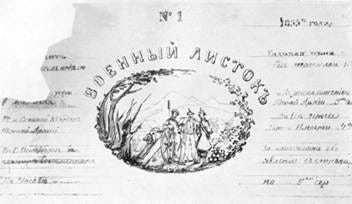Harding History
How we almost lost War and Peace
Leo Tolstoy wrote War and Peace because he could not start a military journal. It may sound like a bad joke. It is not. Here’s what happened.
Tolstoy joined the Tsar’s army at barely twenty-three-year-old for the same reason some young people join ours today: he didn’t have much going on at home and had family already serving. His first assignment was to the Caucasus. There he saw guerrilla action against Chechen rebels but for the most part lolled in garrison as a ‘junker’ or officer in training. When fighting broke out between the Russians and the Turks, Tolstoy requested transfer west with hopes of joining what promised to be a grander fight.[1] His request was approved. By 1854 he found himself in Sevastopol, where he had a front row seat to the Crimean War.
What Tolstoy saw in Sevastopol disturbed him. It wasn’t just the mass suffering of his fellow soldiers that did it. It was what he regarded as the needlessness of their suffering. In the harsh light of its modernized enemy’s bombardment, the Tsar’s army looked primitive. It desperately needed logistical, technological and doctrinal reform. Then-Ensign Tolstoy thought a professional military journal might help. [2] He and some other young officers had first come up with the idea before his arrival in Crimea, but what he saw there gave the idea new force.
Tolstoy’s surviving correspondence outlines what he had in mind for his would-be military publication. The journal would include not only battlefield reports, news of decorations and court martials, and popular articles and soldier’s songs, but also “popular articles on academic branches of the art of war (tactics, artillery, engineering)…”[3] Tolstoy went so far as to create a prototype issue with glossy pages which he mailed to the Tsar and offered his own nobleman’s inheritance to fund the journal’s publication.
A surviving cover page from the draft publication - War Leaflet - which Tolstoy proposed (source: Tolstoy.ru)
It was not to be. The Ministry of War would not tolerate another, less controllable publication in addition to its official one (a sleepy and decidedly noncontroversial outlet called The Russian Invalid). The rejection was unfortunate news for Tolstoy, and perhaps ultimately for the Tsar’s Army, which would persist in its comparatively backward ways for decades more.
Luckily, the editor with whom Tolstoy hoped to work, Nikolay Nekrasov, invited Tolstoy to send his war writing to Nekrasov’s own journal in St. Petersburg. The dispatches Tolstoy sent would launch his writing career. Stymied by the Tsar’s Army, Tolstoy left in 1855. The rest, as they say, is history.
And of course, counterfactuals are not history. We don’t know exactly what might have happened if the Tsar had instead permitted Tolstoy to start his journal. But it seems plausible that with a mind like his, Tolstoy could have become a Major Forrest Harding of his time, running an independent journal for his army to steward its profession and host discussions of needed reform. Perhaps Tolstoy would have made a career of officership, would never found time to research and write War and Peace. Certainly the world would be in one sense poorer without his great novels, but perhaps Tsar’s army would be better off.
Musings aside, one thing is clear from Tolstoy’s story: we should not take for granted the ability of an army to accommodate a meaningful professional dialogue. It is a rare and good thing. Without it, we may yet end up stuck in backwards formations, with only Anna Karenina for comfort.
[1] Rosamund Bartlett, Tolstoy: A Russian Life, 105-107
[2] Rosamund Bartlett, Tolstoy: A Russian Life, 111
[3] Leo Tolstoy and R. F. Christian, Tolstoy's Letters (Scribner, 1978), 48




Hello, I have a couple of articles I want to publish and want to ensure they reach the widest audience. One discusses a concept to include in the army combat medic training program, and the other is a brief paper on the medical threats facing service members and law enforcement working along the Texas/Mexico Border. I appreciate your feedback.